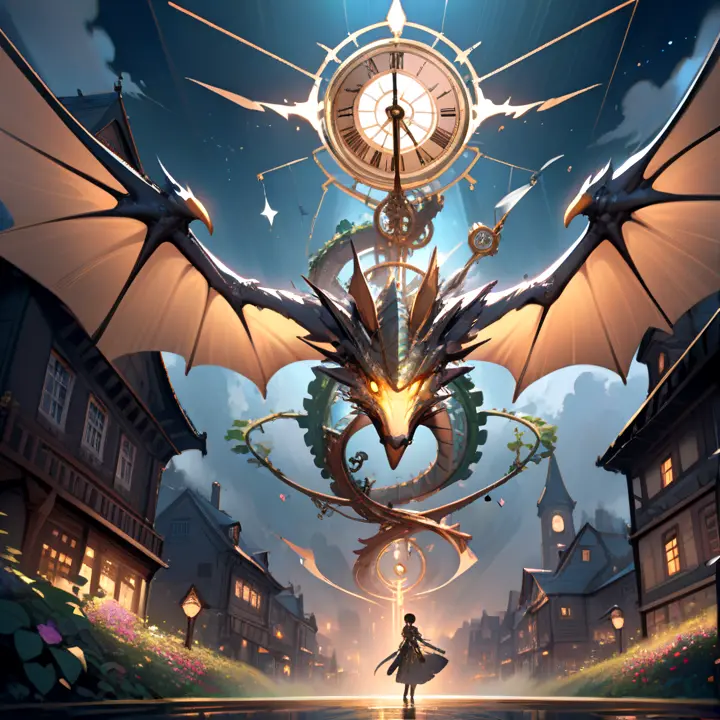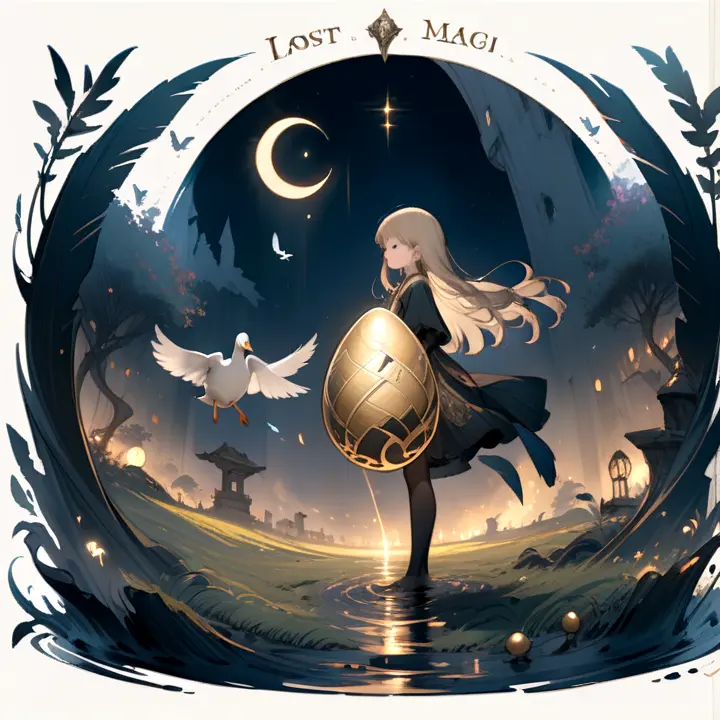In a city where steam-powered carriages clattered over cobblestones and glowing lanterns floated without strings, there lived a young inventor named Elias. His workshop, nestled between a bakery that smelled of cinnamon and a tailor’s shop draped in velvet, was a chaotic symphony of gears, wires, and blueprints. Elias believed in logic, in equations, in the hum of machinery-until the night he met Lyra. 
Lyra was no ordinary woman. She wore a cloak stitched with constellations that shifted under moonlight, and her hair shimmered like liquid silver. Rumors whispered she was the last witch of the Old Woods, a keeper of spells older than the city itself. She arrived at Elias’s door one stormy evening, rain sliding off her cloak as though repelled by an invisible shield.
“Your machines are breaking the balance,” she said, her voice like wind through autumn leaves. “The river spirits grow restless. The clocktower’s gears drown out their songs.”
Elias scoffed. “Spirits? Songs? This city thrives because of technology. We’ve outgrown superstition.”
Lyra’s eyes narrowed. She snapped her fingers, and the workshop’s gas lamps flickered out. In the darkness, tiny orbs of light-pale blue and humming softly-swirled around her. “You see only what your equations allow. But magic isn’t superstition. It’s a language. One your machines have forgotten.”
—
The next morning, the city awoke to chaos. The steam engines powering the elevators froze. The floating lanterns crashed to the ground. Even Elias’s prized invention, a mechanical bird designed to sing opera, let out a metallic screech and fell silent. Panic spread like wildfire.
Elias paced his workshop, oil-stained hands clutching his temples. “This isn’t possible. The systems were flawless!”
A laugh echoed from the doorway. Lyra leaned against the frame, a smirk playing on her lips. “Flawless, perhaps. But lifeless. Your machines have no soul. They cannot *adapt*.”
“And you think *magic* can fix this?” Elias snapped.
“Not magic alone,” she said softly. “But magic *and* machines? That might save your city.”
Reluctantly, Elias agreed. Together, they ventured into the underbelly of the city, where pipes hissed and the air tasted of iron. Lyra knelt beside a gargantuan engine, its pistons groaning. She pressed her palm to its rusted surface and began to sing-a low, resonant melody that made Elias’s bones hum. To his astonishment, the engine shuddered. Flakes of rust fell away, and the pistons began to move, smoother and quieter than before.
“How?” Elias breathed.
“Every machine has a rhythm,” Lyra said. “Your equations map its body. My spells wake its heart.”
—
Days turned to weeks. Elias and Lyra worked side by side, blending gears with incantations, circuits with sigils. They crafted streetlamps that dimmed at the whisper of a lullaby and engines fueled by starlight. The city thrived anew, but not everyone approved.
The City Council, a group of stern men in top hats, summoned Elias. “This¡*collaboration* must end,” declared the Council Head. “Magic is unpredictable. Dangerous. We cannot risk chaos for poetry.”
That night, Elias found Lyra on the rooftop, her cloak billowing in the wind. “They’ll dismantle everything we’ve built,” he said bitterly.
Lyra smiled. “Then let’s give them a show.”
At dawn, the city gathered in the square. The Council demanded proof that magic and machines could coexist. Lyra raised her arms. Elias pressed a button on his brass wristlet.
The ground trembled. From the clocktower emerged a creature of shimmering metal and living vines-a mechanical dragon with eyes like molten gold. It roared, not with fire, but with a chord so deep it resonated in every chest. Flowers bloomed along its steel wings. The crowd gasped.
The Council Head staggered back. “What¡*is* this?”
“A bridge,” said Lyra.
“A beginning,” said Elias.
—
Years later, the city became legend-a place where engineers studied ancient runes and witches tinkered with transistors. Children grew up hearing tales of the inventor and the witch who taught a dragon to sing.
And on quiet nights, if you listened closely, you could still hear the clocktower’s gears humming Lyra’s melody-a reminder that progress need not erase wonder, and that even the oldest magic can find a home in a world of wires.
So tonight, as you drift to sleep, remember: the future isn’t built by choosing between logic and dreams. It’s woven by those brave enough to dance in the space between.
*Sweet dreams, dear reader. May your tomorrow hold both gears and stardust.*


